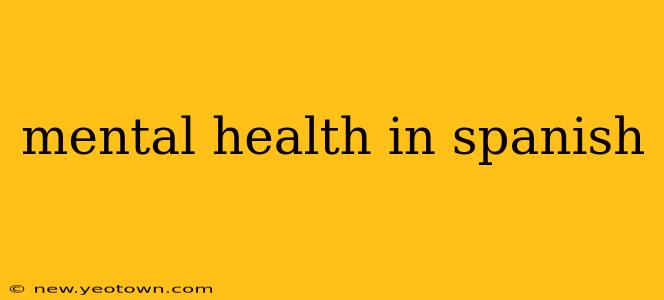Navigating the world of mental health can be challenging, and even more so when language barriers are involved. This guide explores the complexities of discussing and understanding mental health within the Spanish-speaking world, offering insights into terminology, cultural nuances, and resources available. Let's embark on this journey together.
What is the Spanish word for mental health?
The most common and straightforward translation of "mental health" in Spanish is "salud mental." This term is widely understood and used across Spanish-speaking countries. However, the specific phrasing and context can vary depending on the situation. For instance, you might hear phrases like "cuidar la salud mental" (to take care of mental health) or "problemas de salud mental" (mental health problems).
How do cultural factors influence mental health in Spanish-speaking communities?
This is a crucial point. Cultural factors significantly impact how mental health is perceived and addressed in Spanish-speaking communities. In some cultures, open discussion about mental illness might be stigmatized, leading to underreporting and delayed treatment. Family dynamics play a huge role; strong family ties can be both supportive and restrictive, sometimes hindering individuals from seeking professional help. The concept of machismo in some Latin American cultures can further complicate matters, affecting men's willingness to acknowledge and address mental health concerns. Religious beliefs and traditional healing practices also influence how mental health issues are approached.
What are some common mental health issues discussed in Spanish-speaking communities?
While the diagnostic criteria remain consistent across cultures, the manifestation and experience of mental illness can vary. Some common mental health issues frequently discussed and addressed in Spanish-speaking communities include:
- Depresión (Depression): This is universally understood and a significant concern.
- Ansiedad (Anxiety): Similar to depression, anxiety is a widely recognized issue.
- Trastorno de estrés postraumático (PTSD): PTSD, particularly related to political violence or migration experiences, is a growing concern.
- Esquizofrenia (Schizophrenia): A serious mental illness often facing stigma and misunderstanding.
- Bipolaridad (Bipolar disorder): The cyclical nature of mood swings in bipolar disorder can be especially challenging.
Where can I find mental health resources in Spanish?
Thankfully, more resources are becoming available in Spanish to support individuals and families dealing with mental health challenges. You can find information and support through:
- Online platforms: Many mental health organizations offer websites and online resources in Spanish.
- Community centers: Many communities have centers that provide mental health services in Spanish.
- Governmental resources: Various government health departments in Spanish-speaking countries offer programs and services.
- Telehealth options: Remote therapy sessions conducted in Spanish are also increasingly available.
What are some common idioms related to mental health in Spanish?
Idioms and sayings often reflect cultural perceptions of mental health. While not direct translations, some phrases hint at emotional states:
- "Estar hecho un lío": Literally "to be a mess," this reflects a state of emotional turmoil.
- "Tener la cabeza llena de pájaros": Meaning "to have one's head full of birds," it implies being distracted or preoccupied.
- "Estar de los nervios": Translates to "being on edge" and represents anxiety or nervousness.
How can I talk about my mental health with a Spanish-speaking professional?
Be clear and direct about your concerns. Don't be afraid to use simple language if necessary. If you need help finding a translator, many mental health organizations can assist. The key is open communication and finding a provider you trust.
This guide offers a starting point for understanding mental health within the Spanish-speaking world. Remember, seeking help is a sign of strength, not weakness, regardless of language or culture. By increasing awareness and access to resources, we can foster a more supportive and inclusive environment for everyone.

